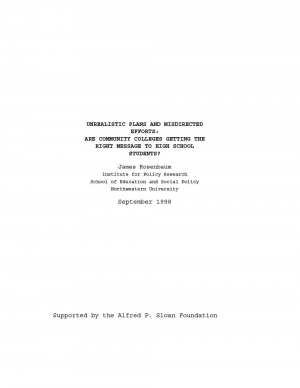Many college-bound youth believe that they can attain their plans even if they do poorly in high school, and these beliefs seem to reduce their efforts in high school.
Analyses of the 1992 follow-up of the HSB national survey suggest that over 80% of "college planning" students with low high school grades fail to complete any college degree 10 years later. Multivariate analyses indicate that high school grades strongly predict educational attainment, predict whether students attain their plans, predict plans-attainment for Black students as well as for White students, and explain much of the lower attainment and disappointed plans of disadvantaged students.
Moreover, high school grades are the sole factor affecting students' failure to attain their original educational plans in open-door colleges. The best way for community colleges to reduce "cooling out" would be to inform students what they must do in high school to make their preparation match their educational plans. Allowing students to hold no-penalty beliefs prevents them from realizing what actions are necessary to make their plans come true and sets them on a course for later disappointment. Policy reforms are suggested.



